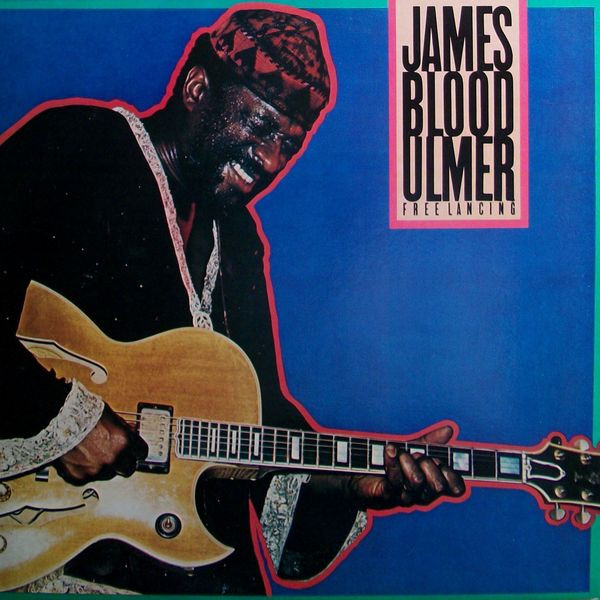Startseite › Foren › Über Bands, Solokünstler und Genres › Eine Frage des Stils › Blue Note – das Jazzforum › james 'blood' ulmer › Antwort auf: james 'blood' ulmer

james blood ulmer, free lancing, columbia 1981.
ulmer (g & voc), amin ali (eb), grant calvin weston (dm), ronnie drayton (rhythm g), irene datcher/ diane wilson/ zenobia konkerite (back voc), david murray (ts), oliver lake (as), olu dara (tp).
The first time I heard Free Lancing, it was so intense it scared the hell out of me.
James Blood Ulmer: Yeah, it scared me too. I’m glad some of those songs had some melody, ’cause I can’t play ’em like that anymore. I don’t even want to try to play like that anymore.
(aus dem gerade erst entdeckten, schönen interview mit john kruth auf waxpoetics.)
FREE LANCING funktioniert sehr ähnlich wie das rough-trade-album, ein erfolgsrezept, an dem man nichts verändern mag. nur die musik ist nochmal härter geworden. terror drummer calvin weston spielt viel rockiger als shannon jackson, mit stop&go-impulsen auf der geschlossenen hi-hat, und über viele toms verteilten geschossen, die denardo colemans gerumpel zwar aufgreifen, aber zu messerscharfen akzenten machen. ali slappt und hängt druckvoll auf bestimmten figuren, ulmers sägender ton ist gleichzeitig überall, schneidet durch die polyrhythmen, macht keine mikrosekunde pause. in den 3 gesangsstücken, in denen ein weiblicher chor ironisch fragen beantwortet wie „where did all the girls come from?“, spielt ronnie drayton eine funk-rhythmus-gitarre und ulmer kann sich aufs solieren zurückziehen, wenn die drei bläser (und eine mundharmonika ohne credit) dazukommen, hören wir quasi das music revelation ensemble. es entsteht der eindruck eines tänzerischen frontalangriffs, noch nicht mal die komplex arrangierten songs fallen da raus, das will verblüffen, überwältigen, überfordern. und es ist schwer verständlich, warum das dabei so locker und unangestrengt wirkt.
What was it like in the early ’80s playing for crowds of punk rockers all dressed in black, opening shows for Public Image Ltd. and Captain Beefheart after gigging with Blakey and Ornette?
I’d stand at the microphone and tell them to shut the fuck up. They had five minutes to get into it or get the fuck out! [laughs] But their attitude was like…they weren’t there to judge. Y’know how people go to clubs and sit and listen to music with their cigarettes, expecting to enjoy it? Shit, we didn’t even enjoy it! The band didn’t even like themselves! [laughs]
in einer auf witzige weise überforderten kritik eines 1981er auftritts von ulmer (mit hemphill, dara, ali und weston) im vorprogramm von captain beefhart (beacon theatre, new york) schreibt andrew sussman in down beat:
Appearing here with a quintet, his solos were maddeningly enticing, frantic and energetic and so incredibly animated as to leave the listener practically exhausted. But Ulmer himself is apparently indefatigable. His discordant modulations hypnotise as they simultaneously relax the listener. Their schizoid, mesmerising quality creates extreme tension yet maintains a driving pulse which could easily be danceable. It is somehow a bizarre combination, yet one which, in UImer’s capable hands, seems totally natural.
Opening the set with an exhilarating trio number, the guitarist was joined by the horn players for the second composition, and the electricity was duly intensified. Each member of the band offered an intelligent voice of his own and an alert understanding of the construction of the piece. Calvin Weston propelled them at an unyielding pace ( all be it his drumming was at times more visual than aesthetic, overpowering the rest of the group and drowning out their statements.)
Thus the direction was established, and the emotional content accelerated. Ulmer played in a fluid style which floated through constantly changing harmonic routes. He is a virtuoso who employs a unique rhythmic, percussive approach; he punctuates impossibly quick runs and clusters with furious passion. His singing voice is somehow reminiscent of Jimi Hendrix bullying his way through a crazy backwards blues. The music is ‘free’ and atonal, yet highly orchestrated and arranged; even when all the artists were improvising concurrently, there was a cohesion which was never lost. Individually, none of the other musicians was able to match Ulmer in content or energy, and Hemphill in particular has been heard to better advantage in other contexts. Hearing them together was an eclectic and draining experience; it was a hard act for Beefheart to follow.
--